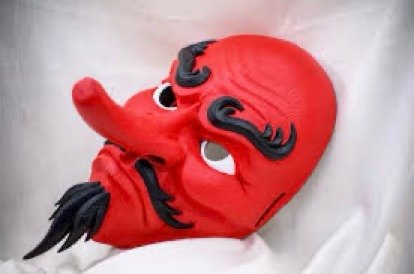In Japanese folklore, Tengu masks are a well-known representation of the mythical Tengu, a magical creature with avian traits. In Japanese folklore, these masks represent a complicated duality: the Tengu are cunning people who guard sacred areas, yet they are also skilled at deceiving people. The history, meaning, and contemporary relevance of Tengu Masks in Japanese mythology and folklore are examined in this article.
What Are Tengu Masks?
Traditional masks of the fabled Tengu, a creature with a red face, sharp eyes, and an excessively long nose, are known as Tengu masks. For generations, these masks have been an integral element of Japanese culture, frequently appearing in performances, festivals, and rituals.
Key Features of Tengu Masks:
Tengu Masks are characterized by their distinctive and symbolic features, each of which reflects the Tengu’s mythological nature and its significance in Japanese rites and mythology.
- Exaggeratedly large nose and red face.
- A fierce expression that conveys strength or mischievous intent.
- utilized in theatrical productions and traditional festivals.
The Tengu’s dual function in Japanese mythology as a trickster and a guardian is reflected in the design of Tengu Masks.
The Origins of Tengu in Japanese Mythology
Tengu were originally described as evil spirits connected to disorder in early Japanese folklore. Their role changed over time. Tengu was once thought to be harmful creatures that would disturb villages and mislead monks, but they have since come to be viewed as guardians of holy places, especially mountains and temples.
Historical Evolution of Tengu:
Over the course of Japanese history, Tengu has been portrayed in a variety of ways, reflecting altering cultural views and beliefs. In early folklore, they were feared and disruptive spirits; today, they are revered defenders and martial arts experts.
- Heian Period (794-1185): Tengu were viewed as disruptive spirits.
- Edo Period (1603-1868): The Tengu’s image softened, becoming associated with wisdom and martial prowess.
This change is reflected in Tengu masks from various eras, which range from ominous designs intended to frighten to more respectable depictions demonstrating their protective function.
Symbolism of Tengu Masks
Rich in symbolism, Tengu masks symbolize the Tengu’s dual roles as a trickster and protector. Depending on how it is interpreted, the long nose, a noticeable feature, can represent either wisdom or arrogance. The dual qualities of the Tengu in Japanese folklore—strong and prone to mischief are reflected in Tengu masks.
Common Symbolism of Tengu Masks:
Tengu masks are extremely symbolic in Japanese folklore, with each feature symbolizing a different facet of the Tengu’s nature, including power, mischief, arrogance, and spiritual wisdom.
- Long Nose: Represents arrogance or spiritual distance.
- Red Face: Symbolizes power and control.
- Fierce Expression: Shows the Tengu’s authority over sacred spaces.
These masks are more than just ornaments because of the meaning they contain; they are a spiritual depiction of the Tengu’s responsibility to protect Japan’s holy sites.
Tengu Masks in Japanese Festivals
Many Japanese festivals, especially those honoring mountain spirits and harvests, revolve around Tengu Masks. Tengu Masks are used to evoke protection and prosperity for the community at festivals like the Tengu Matsuri.
Tengu Masks in Festivals:
Invoking the legendary strength and protection of the Tengu, Tengu masks are a staple of many traditional Japanese festivities, honoring the mythological creatures’ profound cultural significance.
- Tengu Matsuri: A celebration where participants wear Tengu Masks to honor the mythical beings and ask for protection.
- Noh and Kyogen Theater: Traditional performances where Tengu Masks are worn to represent powerful mythical figures.
The Tengu Masks are a striking reminder of the myths that influenced their beliefs, and these celebrations give the community a chance to reconnect with their cultural heritage.

Tengu Masks in Martial Arts
In Japan, Tengu Masks are connected to martial arts in addition to their use in festivals. The masks worn by the Tengu are symbolic of strength, discipline, and knowledge, and they are thought to be masters of martial arts, particularly swordsmanship.
Tengu Masks in Martial Arts:
In martial arts, Tengu masks are highly regarded as symbols of power, self-control, and the spiritual direction of the fabled Tengu, who are thought to be experts in strategy and fighting.
- frequently shown in dojos as a representation of power and self-control.
- It was thought that Tengu’s wisdom served as a guide for samurai fighters.
- The Tengu is a symbol of dexterity, concentration, and combat skill proficiency.
Many martial arts schools still hold Tengu Masks in high regard as a potent symbol of the warrior spirit.
Evolution of Tengu Masks
Tengu Masks’ designs have changed over time to reflect how the Tengu are perceived. Early Tengu masks were hideous and terrifying, but when the Tengu were viewed as kinder people, the masks changed to show protection and wisdom.
Key Stages of Tengu Mask Evolution:
Over the course of Japan’s cultural and historical history, the Tengu were perceived as wise protectors or terrifying spirits, and this has led to several significant modifications in the style and meaning of Tengu masks.
Early Period: In order to convey the Tengu’s chaotic character, masks were made to arouse dread.
Later Era: Masks gained dignity, signifying the Tengu’s protective duty.
This development demonstrates how the Tengu have been seen differently in Japanese culture and how these shifts have been reflected in their masks.
Tengu Masks in Modern Japan
Tengu masks still have cultural significance today. They are frequently found in shrines and temples, where they are exhibited as protective symbols. They have also gained popularity as souvenirs, symbolizing the rich spiritual and folkloric traditions of Japan.
Modern Uses of Tengu Masks:
As a testament to its lasting cultural and mythological significance in Japan, Tengu Masks are still employed today in a wide range of contexts, from popular souvenirs and artwork to spiritual emblems in temples.
- Temples and Shrines: Displayed as symbols of protection and spiritual power.
- Souvenirs and Decorations: Popular among tourists and collectors for their cultural significance.
- Festivals: Still worn during certain festivals to honor the Tengu.
Tengu Masks are still a powerful representation of the relationship between the material and spiritual realms in Japan, even after all these years.

Collecting Tengu Masks
Because of their cultural significance and artistic excellence, Tengu masks are highly sought after by collectors from Japanese Store. Because they are created utilizing age-old techniques that have been passed down through the centuries, handcrafted Tengu masks are particularly valued.
Reasons for Collecting Tengu Masks:
Tengu masks are highly prized objects for both collectors and fans of Japanese folklore because of their rich cultural legacy, exquisite craftsmanship, and spiritual meaning. As a result, collecting them has grown in popularity among enthusiasts.
- Cultural Significance: Represent the duality of Tengu as protectors and tricksters.
- Artistic Value: Handcrafted masks are considered unique works of art.
- Symbol of Protection: Displaying a Tengu Mask is believed to bring protection and strength.
Tengu Masks are a physical link to Japan’s rich mythological heritage as well as a statement of artistic beauty for collectors.
Tengu Masks in Global Pop Culture
Tengu Masks have been a part of popular culture around the world in recent years, showing up in a variety of media such as anime, video games, and movies. Tengu are a captivating character in stories because of their magical allure, which includes their interesting dualism and supernatural abilities.
Tengu Masks in Global Media:
Tengu Masks have entered the world of media, showing up in video games, anime, and movies where their complex symbolism and enigmatic charm enthrall viewers outside of Japan by fusing ancient mythology with contemporary narrative.
- Anime and Manga: Tengu characters and masks frequently appear in Japanese animated series and comics.
- Video Games: Tengu are often portrayed as powerful enemies or mentors in popular video games.
- Films and TV Shows: The unique design and symbolism of Tengu Masks have been featured in international films and shows, adding a touch of Japanese folklore to global media.
As a result of Tengu Masks’ integration into popular culture worldwide, Japanese mythology has gained more recognition, and Tengu has become a universal representation of strength and mysticism.
Tengu Masks as a Spiritual Guide
Tengu masks are more than just a cultural relic for many people; they are spiritual mentors. According to Japanese tradition, Tengu, particularly in the martial arts, have the capacity to lead people to enlightenment. Therefore, the masks stand for more than just physical prowess; they also reflect the quest for spiritual development and inner understanding.
Spiritual Importance of Tengu Masks:
In Japanese culture, Tengu Masks are deeply symbolic of the quest for enlightenment, protection, and direction, particularly in the fields of martial arts and personal development.
- Symbol of Enlightenment:
Tengu masks are a symbol of enlightenment, signifying the path to intellectual and spiritual mastery.
- Martial Arts Guide:
The Tengu are regarded as martial artists’ protectors and mentors due to their legendary status as masters.
- Guardian Spirit:
Wearing a Tengu mask is thought to call forth the Tengu’s protection and direction for one’s own development.
Tengu Masks serve as a reminder to many martial artists and spiritual searchers of the harmony between inner understanding and physical might.
The Enduring Legacy of Tengu Masks
For ages, Tengu Masks have been an important part of Japanese mythology and tradition. They are still utilized in festivals, martial arts, and contemporary collections, symbolizing the Tengu’s dual nature as a trickster and guardian.
Tengu Masks continue to be a significant component of Japan’s cultural legacy, whether they are valued for their mythological significance or appreciated for their artistic workmanship.
Tengu Masks’ enduring impact reveals their profound cultural roots in Japan, tying the contemporary world to antiquated customs and beliefs. Their enduring appeal is demonstrated by their ongoing appearance in temples, festivals, and homes.







Leave a Comment